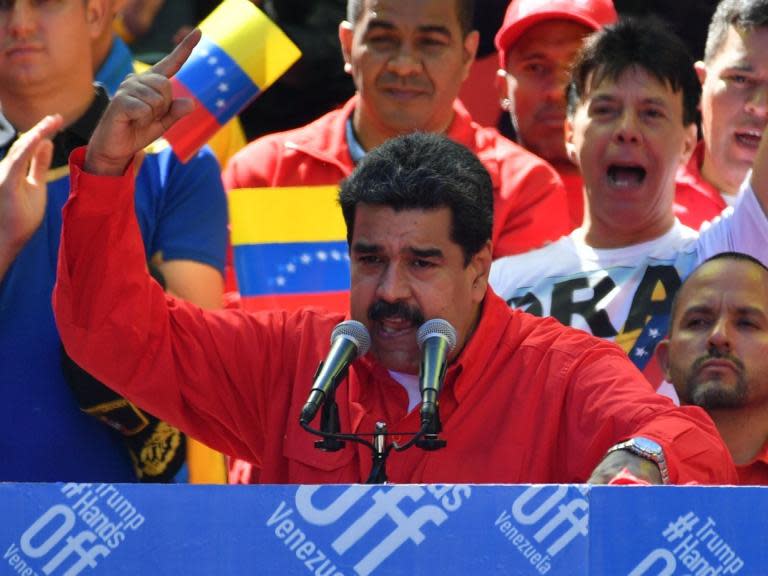A foreign military intervention in Venezuela has taken place, and Prince Charles could help to stop it
Why are we ignoring a foreign power’s role in propping up Nicolas Maduro’s regime in Venezuela? Juan Guaido, the opposition leader who has declared himself the country’s legitimate president, believes that Cuban intelligence is the main factor preventing the military from abandoning Maduro.
Guaido’s National Assembly has just passed a decree forbidding subsidised oil exports to Cuba and asked for international help in enforcing it. But in Europe, including Britain, we are doing little of any use. On Sunday, Prince Charles and his wife Camilla are due to land in Havana to become the first members of the royal family to make an official visit to the island. That trip should be postponed until Cuban operatives withdraw from Venezuela.
In Spain, foreign minister Joseph Borell has declared himself absolutely opposed to military intervention in Venezuela. “We will firmly condemn any foreign military intervention,” he recently insisted. But he refuses to recognise that this has already taken place, and Spain is effectively sustaining it through its supportive policies towards Cuba.
The Cuban force in Venezuela numbers between 15,000 and 22,000 men, according to most estimates. The secretary general of the Organisation of American States has stated that Cuba’s “army of occupation” amounts to 15,000 men. Colombia’s ambassador to the UN states that Cuba has provided “more than 22,000 men in charge of refining repression and the police state”.
Foresight Cuba, an independent think tank which gathers statistics on the country, has identified 4,500 Cuban infantrymen organised in eight battalions of 500 troops, plus a battalion stationed in Fuerte Tiuna; two brigade generals; four colonels; eight lieutenant colonels; six frigate captains and 25 junior officers. This information has been gathered from unofficial sources within Cuba and the Cuban military.
There are other Cuban troops located in different strategic points throughout Venezuela. Agents of Cuban military counter-intelligence control the Ministry of Defence and the General Staff and are positioned in the high commands of the national guard, the army, the air force and the Venezuelan navy. There are also some 3,700 agents of the Department of State Security of Cuba, of which some hundreds are assigned to guarding Maduro.
Venezuelan officers who have opposed Cuban control have been dismissed, jailed or exiled. One of the first to denounce Chavez’s policy of bringing in the Cubans was General Antonio Rivero, who said in April 2010 that “the penetration of Cuban officers into the heart of the Venezuelan armed forces is a dangerous interference in strategic areas”. General Rivero fled abroad after Chavez issued a warrant for his arrest.
The Cubans have focused their control on areas which provide the maximum information on the Venezuelan population. They run the personal identification and notary registers having designed and implemented the relevant IT systems. Thus their intelligence apparatus keeps tabs on every Venezuelan citizen. Critically, they lead the effort to identify and suppress any dissent within the armed forces against the Maduro dictatorship.
For democracy to be restored in Venezuela, Cuba needs to be pushed into withdrawing its forces. That requires a sharp change in approach towards Cuba from countries like Spain, and indeed from the EU as a whole, which has similarly attacked the idea of military intervention in Venezuela.
This might be too much for countries like Greece, whose government actually backs the Chavista dictatorship, but for the vast majority of EU member states it is a no-brainer. If they are serious about restoring democracy in Venezuela, they should do all they can to get Cuba to withdraw.
“The Spanish government will continue investing in Cuba. The obstacles we encounter in the way will not interrupt nor slow down the increases in commercial and investment ties between our two countries,” said Spanish prime minister Pedro Sanchez when he visited Cuba last November.
This investment should now cease, and steps should be taken to persuade European tourists to give Cuba a miss, until it pulls out of Venezuela. Each European country should adjust its approach to Cuba accordingly. It is clear that this month’s royal visit to Cuba sends quite the wrong message.
European countries need to be consistent. They cannot condemn future foreign military intervention in Venezuela while condoning the current one. If they oppose the use of force then they need to use all peaceful means to persuade the Cuban government and Maduro regime to stop using force. Giving peace a chance means getting Cuban forces out of Venezuela.
Andrew Lewer is Conservative MP for Northampton South

 Yahoo News
Yahoo News 

